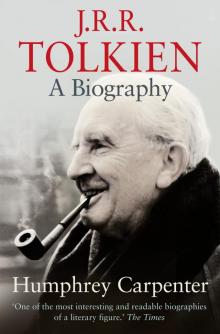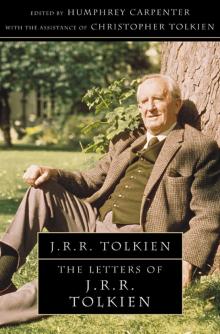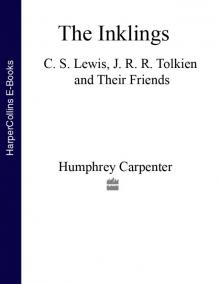- Home
- Humphrey Carpenter
The Letters of J.R.R. Tolkien Page 10
The Letters of J.R.R. Tolkien Read online
Page 10
56 From a letter to Christopher Tolkien
1 March 1944 (FS 6)
[For ‘The Useless Quack’, see the introductory note to no. 48.]
As I have hardly seen anybody in the last few weeks there is no quip, jest, or other item of merriment to record. The Useless Quack has returned to Oxford! Almost the only wire I have ever pulled that has rung a bell. But there he is, uniform, red-beard, slow smile and all, still in Navy, but living at home and working on his research Board (Malaria). He seems pleased, and so do the Board. All done at the Mitre – where I picked up an urgent enquiry as to his whereabouts, as being the one man wanted. He was on the other side of the globe just then. Lewis is as energetic and jolly as ever, but getting too much publicity for his or any of our tastes. ‘Peterborough’, usually fairly reasonable, did him the doubtful honour of a peculiarly misrepresentative and asinine paragraph in the Daily Telegraph of Tuesday last. It began ‘Ascetic Mr Lewis’ ——!!! I ask you! He put away three pints in a very short session we had this morning, and said he was ‘going short for Lent’. I suppose all the stuff you see in print is about as accurate about Tom, Dick, or Harry. It is a pity newspapers can’t leave people alone, and don’t make some effort to understand what they say (if it is worth it): at any rate they might have some standards that would prevent them saying things about people which are quite untrue, even if not actually (as often) painful, angering, or indeed injurious. . . . .
Still very cold. Snow last night. But there is no mistaking the growing power of a March sun. Clumps of yellow crocus are out, and the white-mauve ones beginning; green buds are appearing. I wonder what you think of the season-reverse south of the Line? More or less the equivalent of early September with you, I suppose. My earliest recollection of Christmas is of a blazing hot day.1
57 From an airgraph to Christopher Tolkien
30 March 1944 (FS 12)
I saw the two Lewis bros. yesterday, & lunched with C.S.L.: quite an outing for me. The indefatigable man read me part of a new story! But he is putting the screw on me to finish mine. I needed some pressure, & shall probably respond; but the ‘vac.’ is already half over & the exam. wood only just cleared.
58 To Christopher Tolkien
[A description of a visit to Birmingham, where Tolkien was attending a lunch given by the new headmaster of his school, King Edward’s, which since his schooldays had moved to new buildings in another part of the city.]
3 April 1944 (FS 13)
20 Northmoor Road, Oxford
My dearest,
I wrote you an airgraph1 on Thursday last at night; but unfortunately it was not sent off on Friday, and on Saturday I went off early and in a rush to Brum. So it has only gone today. Nothing more has come from you since yours of 13 March (arrived 28). I can’t remember much about Friday, except that the morning was wrecked by shopping and queueing: result one slab of pork-pie; and that I had a dreadfully bad and lugubriously dull dinner in college, and was glad to get home before 9 p.m. But I have begun to nibble at Hobbit again. I have started to do some (painful) work on the chapter which picks up the adventures of Frodo and Sam again; and to get myself attuned have been copying and polishing the last written chapter (Orthanc-Stone). Saturday was a memorable day. Grey, damp and unpleasing. But I got off about 9 a.m. Cycled to Pembroke and deposited bike and lamps. Caught the 9.30, which (just, I suppose, because I had time to spare) left Oxford on time (!!!), for the first time in human memory, and reached Brum only a few minutes late. I found myself in a carriage occupied by an R.A.F. officer (this war’s wings, who had been to South Africa though he looked a bit elderly), and a very nice young American Officer, New-Englander. I stood the hot-air they let off as long as I could; but when I heard the Yank burbling about ‘Feudalism’ and its results on English class-distinctions and social behaviour, I opened a broadside. The poor boob had not, of course, the very faintest notions about ‘Feudalism’, or history at all – being a chemical engineer. But you can’t knock ‘Feudalism’ out of an American’s head, any more than the ‘Oxford Accent’. He was impressed I think when I said that an Englishman’s relations with porters, butlers, and tradesmen had as much connexion with ‘Feudalism’ as skyscrapers had with Red Indian wigwams, or taking off one’s hat to a lady has with the modern methods of collecting Income Tax; but I am certain he was not convinced. I did however get a dim notion into his head that the ‘Oxford Accent’ (by which he politely told me he meant mine) was not ‘forced’ and ‘put on’, but a natural one learned in the nursery – and was moreover not feudal or aristocratic but a very middle-class bourgeois invention. After I told him that his ‘accent’ sounded to me like English after being wiped over with a dirty sponge, and generally suggested (falsely) to an English observer that, together with American slouch, it indicated a slovenly and ill-disciplined people – well, we got quite friendly. We had some bad coffee in the refreshment room at Snow Hill, and parted.
I then strolled about my ‘home town’ for a bit. Except for one patch of ghastly wreckage (opp. my old school’s site) it does not look much damaged: not by the enemy. The chief damage has been the growth of great flat featureless modern buildings. The worst of all is the ghastly multiple-store erection on the old site. I couldn’t stand much of that or the ghosts that rose from the pavements; so I caught a tram from the same old corner at which I used to catch it to go out to the playing fields. Down the shabby (much bomb-pocked) Bristol Road to Edgbaston Park Road at 12.15 (half an hour too soon). I won’t weary you with impressions of the ghastly utterly third-rate new school buildings. But if you can imagine a building better than most Oxford colleges being replaced by what looks like a girls’ council school, you’ve got it and my feelings. And apparently the new Head Master’s. In a speech after lunch he hinted (or more than that) that they were pretty foul, and the school would never recover from the blow if something was not done about it. There were about 120 Old Boys (out of 220 asked): many of my vintage. I saw faces I had not seen since I was your age – and to many I could give only initials, not names. All Old Edwardians remember initials. To my complete surprise I found that I was remembered chiefly for rugger-prowess (!!) and my taste in coloured socks. . . . .
59 From an airgraph to Christopher Tolkien
5 April 1944 (FS 14)
I have seriously embarked on an effort to finish my book, & have been sitting up rather late: a lot of re-reading and research required. And it is a painful sticky business getting into swing again. I have gone back to Sam and Frodo, and am trying to work out their adventures. A few pages for a lot of sweat: but at the moment they are just meeting Gollum on a precipice. What a lot of work you put into the typing, and the chapters written out so beautifully! I wish I still had my amanuensis and critic near at hand.
60 To Christopher Tolkien (airgraph)
[Christopher had now arrived in South Africa, and was at a camp in the Transvaal.]
13 April 1944 (FS 15)
20 Northmoor Road, Oxford
Dearest: your Airletter of 25 March (?), postmd. 28th, arrived this morning: very welcome. By now you should be getting news from me: have been writing about twice a week. I don’t comment on your letter, though I am v. sorry. Know how you feel! Especially about cancelled leave. Your letter was ‘deur Sensor oopgemak’1 by the way. You do not seem to have done anything very useful since September! I miss you hourly also, and am lonely without you. I have friends, of course, but can seldom see them. Things a bit easier for me now, though. Helped in the admission of cadets today (as big a bunch as ever), but as far as I can see they will not concem me further this term – joy! I did see C.S.L. & Charles Williams yesterday for almost 2 hours (cut short by having to meet M. & P.2 for lunch at 12.20, which proved unobtainable so that we had to return home). I read my recent chapter: it received approbation. I have begun another. Shall have spare copies typed, if possible, & sent out to you. Don’t think there’s more news at moment. . . . . Am actually going out tonight to Magdalen: C.S.L., Warnie3 (writing
a book: it’s catching), C.W., David Cecil,4 and prob. the Useless Quack (still bearded and uniformed): quite an event for me. . . . . Now I will return to Frodo & Gollum for a brief spell. More tomorrow, when this shall go off. . . . . Saturday 15th. I’m afraid this didn’t get off. I had a very pleasant time on Thurs. All turned up except Cecil, & we stayed until after midnight. The best entertainment proved to be the chapter of Major Lewis’ projected book – on a subject that does not interest me: the court of Louis XIV; but it was most wittily written (as well as learned). I did not think so well of the concluding chapter of C.S.L.’s new moral allegory or ‘vision’, based on the mediæval fancy of the Refrigerium, by which the lost souls have an occasional holiday in Paradise. Yesterday morning I managed to get an hour or two writing, & have brought Frodo nearly to the gates of Mordor. Afternoon lawn-mowing. Mrs. C.5 arrived safely from Carmarthen on Thurs. bringing gifts comestible. . . . . I had a pretty wearing time on ‘exercise’ up till 10 p.m. & then supped with the family, & then went to ‘sleep’ at area H.Q. That I did not manage: I had hardly a wink. Post is right on main road: very noisy all night. . . . . M. & I are going to have tea with the Nichol Smiths6 today, & I am supping with Elaine,7 and others at a small don-party. Quite a week for me. But term begins next week, & proofs of Wales papers8 have come. Still I am going to continue ‘Ring’ in every salvable moment. . . . .
61 From a letter to Christopher Tolkien
18 April 1944 (FS 17)
It has been a great event to-day, all your crowd of letters arriving, and much delaying the eating of breakfast. . . . . Your accounts, which were uncensored, distressed but did not surprise me. How it reminds me of my own experience! Only in one way was I better off: wireless was not invented. I daresay it had some potential for good, but it has in fact in the main become a weapon for the fool, the savage, and the villain to afflict the minority with, and to destroy thought. Listening in has killed listening. I can only hope you won’t have any more Altmarks!1 I was always against your choice of service (on the ground it seems a war behind); but at least it should not later land you often in to the animal horror of the life of active service on the earth – such as trenchlife as I knew it. Even HP2 were a Paradise to that and the Altmark not (prob.) much worse. At least at present you are getting an occasional chance to read. I am glad. God bless you. Ðys dógor þu geþyld hafa wéana gehwylces, swá ic þé wéne to.3 If the censor (and you) will permit me to quote an ancient English poet – and I can’t help thinking it comes better from father to son, than from young Béowulf, about your age, to old greybeard Hrothgar! Úre æghwylc sceal ende gebidan worolde lífes: wyrce se þe móte domes laer déaþe.4 Cold stern counsel; and much depends on ‘he who may’, and on what you consider to be dóm.
I am surprised that, tasting and disliking the very opposite, you should also dislike the ‘manners’ of life 150 years ago (nearly) as depicted by Jane [Austen]. Little is left of it all, save a few remnants of table-manners (among a decreasing minority). But actually they made life a lot easier, smoother, and less frictional and dubious; and cloaked or indeed held in check (as table-manners do) the everlasting cat, wolf, and dog that lurk at no great depth under our social skin. . . . .
I hope to see C.S.L. and Charles W. tomorrow morning and read my next chapter – on the passage of the Dead Marshes and the approach to the Gates of Mordor, which I have now practically finished. Wasted some time on Sunday answering a letter from the Eighth Army (!). I get a good many of the kind, but this one was rather amusingly written. The ‘Regius Professor of English’ was asked to adjudicate on a dispute which was rending the Mess of a certain light A.A. Regt R.A. into a faction-war: how to pronounce the name of the poet Cowper. Big Money hangs on the issue. The letter was from the adjutant (who appeared to have read the poet, even The Task, ‘in his wayward youth’). I can’t help thinking that the Army shows spots of more wit and intelligence – you may one day strike some in your service (mais je le doute). Deeming it below the dignity of a ‘Regius Prof.’ to adjudicate on Big Money, I sent as Delphic an oracular reply as I could, giving the adjt. a good deal more facts, I expect, than he wanted. Not of course that there is any doubt that the poet called himself Cooper (of which his name is merely the older spelling): oup, owp spells oop in English: there are no aups (in Latin value): so stoup, group, soup and formerly also droup, stoup (verb), troup, coup(er), whouping-cough, loup, etc. (not to mention roum, toumb). Yesterday I had a visit from F. Pakenham,5 getting up a combined Christian Council of all denominations, for this city, as now in 50 others. I joined, but refused the proffered secretaryship (you bet!). Term has almost begun: I tutored Miss Salu6 for an hour. The afternoon was squandered on plumbing (stopping overflow) and cleaning out fowls – less grudgingly, as they are laying generously (9 again yesterday). A lovely morning dawned on us this morn. A mist like early Sept. with a pearl-button sun (8 a.m. being really 6 a.m.) that soon changed into serene blue, with the silver light of spring on flower and leaf. Leaves are out: the white-grey of the quince, the grey-green of young apple, the full green of hawthorn, the tassels of flower even on the sluggard poplars. The narcissuses are a marvellous show, but the grass grows so quick that I feel like a barber faced with a never-ending queue (& not a chinaman’s either, to be trimmed with one snip).
I cannot tell you how I miss you, dear man. I would not mind it, if you were happier or more usefully employed. How stupid everything is!, and war multiplies the stupidity by 3 and its power by itself: so one’s precious days are ruled by (3x)2 when x=normal human crassitude (and that’s bad enough). However, I hope that in after days the experience of men and things, if painful, will prove useful. It did to me. As for what you say or hint of ‘local’ conditions: I knew of them. I don’t think they have much changed (even for the worse). I used to hear them discussed by my mother; and have ever since taken a special interest in that part of the world. The treatment of colour nearly always horrifies anyone going out from Britain, & not only in South Africa. Unfort. not many retain that generous sentiment for long. I don’t say anything about home conditions. You will (I suppose) hear on radio as much as I could say. We are all well at the moment. We are waiting. I wonder for how long now. Not long I think. I see from paper that Air Crew training in Canada is being cut: fewer A.C. generally are now to be trained. I thought I guessed from your letter that you do not now expect to come to G. B. to finish. I hope that is not so. But who knows? We are in God’s hands. Our lot has fallen on evil days: but that cannot be by mere ill chance. Take care of yourself in all due ways (aequam serva mentem, comprime linguam7). . . .
62 From an airgraph to Christopher Tolkien
23 April 1944 (FS 18)
I read my second chapter, Passage of the Dead Marshes, to Lewis and Williams on Wed. moming. It was approved. I have now nearly done a third: Gates of the Land of Shadow. But this story takes me in charge, and I have already taken three chapters over what was meant to be one! And I have neglected too many things to do it. I am just enmeshed in it now, and have to wrench my mind away to tackle exam-paper proofs, and lectures (beginning on Tuesday).
63 To Christopher Tolkien
24 April 1944 (FS 19)
20 Northmoor Road, Oxford
My dearest Chris,
Your airletter. . . . arrived at breakfast this morn. I had the uncommon luxury of lying a-bed with toast and home-made marmalade (a good many oranges and lemons lately) and your letter. St George’s day passed uneventfully; I sat up ‘on duty’ till 1.30 this morn, and then decided to retire: it is so warm one can sleep with open windows and hear alerts. I was drawing my curtains when I noted a v. white light S.W., and I was just putting foot in much desired sheets when Ulysses’ Peril1 let off her wail. Did not in fact get to bed till past 3.30, or sleep till 4, or wake till 8.45, or get up till 9.45. . . . . I spent what was left of this morning in town doing odd jobs, among them that of getting my head-harvest reaped: a big crop: still fertile soil evidently. Mitre2 was locked! Have not tasted beer sin
ce Thursday last when our barrel ran dry, & has not yet been replaced. I have to lecture tomorrow, so now I must stop for the moment. . . . .
Wed. 26 April. . . . . Yesterday felt effects of Sunday night. Went off early to town and did some executor’s business for Mrs Wright,3 gave a poor lecture, saw the Lewises and C.W. (White Horse) for ½ hour; mowed three lawns, and wrote letter to John, and struggled with recalcitrant passage in ‘The Ring’. At this point I require to know how much later the moon gets up each night when nearing full, and how to stew a rabbit! No Lewis this morning, as he has been appointed Clarke Lecturer in Cambridge, and leaves early to lecture there at 5 p.m. on Wednesdays. . . . .
3.45 Wed. A record college meeting (12½ mins.)! Arrived back to find Biddy had broken another egg (about the 7th), so, despairing that the ‘henwife’ would attend to it, I have spent an agreeable time catching her (i.e. the bird), cleaning her, trimming her and disinfecting her – and then disinfecting myself. Grr! The fourth lawn will have to wait. I was pleased that you managed to get some church at the end of Holy Week, though not too pleased with your Even-christians (as they called ‘em in O. & M.E.).4 However that cannot be helped. The only salve is the sudden reflection that one of them is prob. making an adverse judgement on oneself, not unreasonable as founded on one’s looks and deportment, but as wide of the mark of the inner self as our own are! God ána wát.5 But as for sermons! They are bad, aren’t they! Most of them from any point of view. The answer to the mystery is prob. not simple; but part of it is that ‘rhetoric’ (of which preaching is a dept.) is an art, which requires (a) some native talent and (b) learning and practice. The instrument used is v. much more complex than a piano, yet most performers are in the position of a man who sits down to a piano and expects to move his audience without any knowledge of the notes at all. The art can be learned (granted some modicum of aptitude) and can then be effective, in a way, when wholly unconnected with sincerity, sanctity etc. But preaching is complicated by the fact that we expect in it not only a performance, but truth and sincerity, and also at least no word, tone, or note that suggests the possession of vices (such as hypocrisy, vanity) or defects (such as folly, ignorance) in the preacher.

 J. R. R. Tolkien
J. R. R. Tolkien Mr Majeika and the School Caretaker
Mr Majeika and the School Caretaker Mr Majeika Joins the Circus
Mr Majeika Joins the Circus Mr Majeika on the Internet
Mr Majeika on the Internet Mr Majeika and the Ghost Train
Mr Majeika and the Ghost Train Mr Majeika and the Lost Spell Book
Mr Majeika and the Lost Spell Book Mr Majeika and the School Book Week
Mr Majeika and the School Book Week The Letters of J.R.R. Tolkien
The Letters of J.R.R. Tolkien Mr Majeika and the School Inspector
Mr Majeika and the School Inspector Mr Majeika and the Music Teacher
Mr Majeika and the Music Teacher The Inklings
The Inklings Mr Majeika and the School Trip
Mr Majeika and the School Trip Mr Majeika and the Dinner Lady
Mr Majeika and the Dinner Lady Mr Majeika and the School Play
Mr Majeika and the School Play